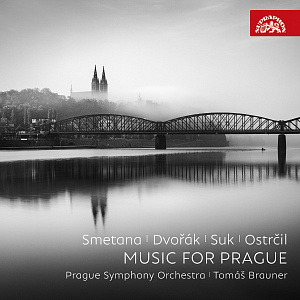Album

Prague Symphony Orchestra, Tomáš Brauner
Smetana, Dvořák, Suk, Ostrčil: Music for Prague
Prague Symphony Orchestra, conductor Tomáš Brauner
The story of the Prague Symphony Orchestra is closely related to the history of the Czech capital, which leaves an impression on their repertoire. After their successful recording of Karel Husa’s Music for Prague 1968 (Supraphon, 2021), the orchestra and its chief conductor are coming up with another album dedicated to Prague. This time, the programme is focused on the late 19th century, i.e. the period when the Czech nation fought for its language, culture and identity within the Austro-Hungarian Empire. The backbone of the record is Suk’s monumental symphonic poem Praga, based on the Hussite chorale, “Ktož jsú Boží bojovníci” (Ye Who Are Warriors of God); Vyšehrad from Smetana’s famous cycle Má vlast (My Country); and a rarity: Pohádka o Šemíku (A Tale of Šemík), which is a largely unknown symphonic poem based on an ancient Czech legend connected with Vyšehrad, by Otakar Ostrčil, composed when he was nineteen. And of course, there is Antonín Dvořák. In hardly any work of his is Dvořák as explicitly patriotic as in his overture My Home (which is not very well known either). It is based on the theme of the popular song “Kde domov můj,” which later became the Czech national anthem. Another rarity of this album is Dvořák’s fanfare for the opening of the National Jubilee Exhibition in Prague. After their acclaimed recording of the composer’s Slavonic Dances, the Prague Symphony Orchestra confirm that the Czech repertoire of late Romanticism is their native and most natural language.
The romantic and legendary city of Prague on a record of the Prague Symphony Orchestra
Reviews
“Imprégnés de leur culture musicale nationale, Brauner et ses Pragois servent ces musiques avec une fraîcheur, une ferveur et un naturel qui désamorcent l'emphase que certaines peuvent suggérer, tout en soulignant leur générosité et leur sincérité.”
Classica, September 2024
“The main reason to get this disc is for Ostrčil’s A Tale of Šemik, for which this is for all practical purposes the only available recording, and Dvořák’s Fanfare, where this version is as good or better than its four recorded predecessors… the playing is spirited and committed, and the recorded sound is fine. It simply comes up short when compared to major alternatives.”
Fanfare, October 2024
“Suk’s sprawling tone poem gets a grand, dramatic reading from Brauner and the orchestra – a fitting capstone for this enjoyable album. The Prague Symphony plays beautifully. Overall, these accounts have the right Czech flavor, and the program is very enjoyable, especially for the Suk and the Ostrcil. Recorded in the Smetana Hall of the Prague City Hall, the sonics are crisp and clear and spacious.”
American Record Guide, October 2024
|
Antonín Dvořák
|
|||
| 1. | Fanfare for the Opening of the National Jubilee Exhibition in Prague 1891 | 02:23 | |
|
Antonín Dvořák
|
|||
| 2. | My Home. Ouverture, Op. 62 | 09:44 | |
|
Otakar Ostrčil
|
|||
| 3. | A Tale of Šemík. Tone Poem, Op. 3 | 18:59 | |
|
Bedřich Smetana
|
|||
| 4. | The Prague Carnival. Introduction and Polonaise | 05:57 | |
|
Bedřich Smetana
|
|||
| 5. | Vyšehrad. Tone Poem | 14:44 | |
|
Josef Suk
|
|||
| 6. | Praga. Tone Poem, Op. 26 | 23:28 | |